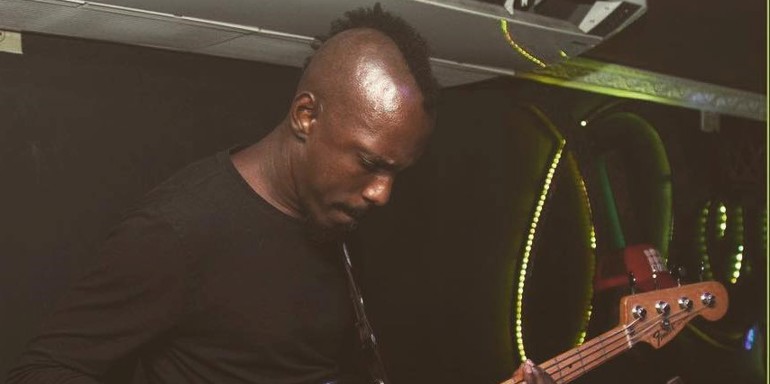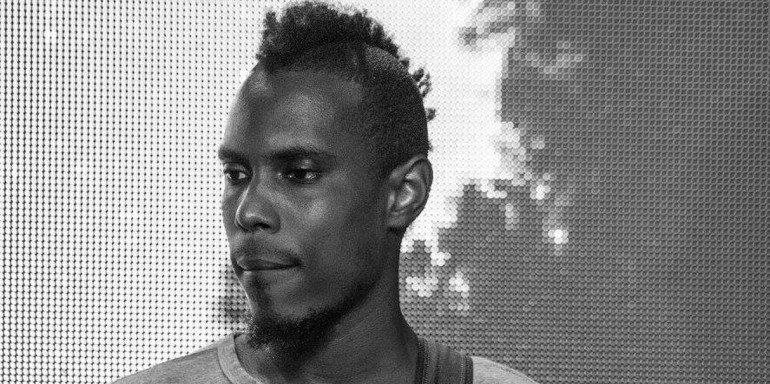
Course Studied: BA (Hons) Music (Jazz)
Year of Graduation: 2015
Top Career Highlights:
- Performing at the 2012 Olympics with 3Canal
- Canadian tours with '12 The Band', 3Canal and 5 Miles to Midnight
- Performing at UK and European festivals, alongside acts such as Rita Ora, John Newman and James Arthur
Born in Trinidad, Clint Harewood is a versatile bassist and multi-instrumentalist. Clint has played with rapso group 3Canal at the London 2012 Olympic Games, and since graduating, has joined acclaimed band 5 Miles to Midnight.
Clint moved to the UK to complete a BTEC qualification, before studying on the BA (Hons) Music (Jazz) programme at Leeds Conservatoire.
We caught up with Clint to learn more about his experiences of studying internationally.
Tell us about your first encounter with music?
My first encounter with music, would have been what I think most people would have experienced, being curious with their parents records. My mother is not a musician, but she is a music fanatic, and I would sit in front of this record player and totally absorb everything that was being played. I didn’t understand theoretically or harmonically what was being played, but I felt like it was another world I enjoyed plugging into. I still get the same feeling when I listen to my favourite albums, songs or when I’m playing on some of my favourite gigs.
What made you decide to move from Trinidad and Tobago to study in the UK?
At that time I had gotten a scholarship to play football in America, but I felt like football was not what I wanted to do anymore. I think my mother, mentioned one day, “Why don’t you look up music schools…”. It was not a hard decision after that, I applied to some Canadian universities, but I really enjoyed British culture more. ‘Arctic Monkeys’ and ‘Foals’ were my favourite bands at the time, and I wanted to experience living in London, where I did a BTEC program. Then when applying for university courses, I wanted one on one lessons and funnily enough, I was attracted to the Leeds Conservatoire website, which is honestly what firstly got me interested in moving to Leeds.
You performed at the 2012 Olympics with 3Canal. What did this involve?
We were invited to perform at the 'Trinidad and Tobago Cultural Village' in central which in a fun way, involved some of the best moments I’ve had on a tour! I’ve been doing tours with bands since my early twenties, but it was always with another band on the same label, or stand-alone gigs. Those gigs with 3Canal however, they were in the middle of one of the biggest sporting events in the world. That’s incredible to think! I want to believe also, it was great for displaced Trinbagonians and expats, for example to see some of their favourite acts during that festive time. The cultural village involved a few acts from different parts of the music industry here, and we were the representatives of the “Rapso” music industry, which 3Canal is probably top of the ladder of. We would play every two or three nights, within a two-week period, then go to other cultural villages and Olympic events during the day, which were cheap, luckily. It’s a great feeling, being able to represent your country at an event like the Olympics, and to be able to exhibit your music where the rest of the world is gathered.
What ensembles or projects have you been involved with since?
Currently, despite the interruption of Covid-19, my main projects are with an “Island Rock” band, called 5 Miles to Midnight, a Caribbean Jazz singer and flautist called Ruth Osman, a folk singer called Solman and the daughter of the originator of Soca music, Marge Blackman. They are all singers, but with very moving, conscious music, which I enjoy. Outside of that, once a month I play at a Reggae themed night called, “Roots Yard”. I play in the house band and we do a lot of Reggae/Dub classics.

How did your experiences on the Jazz programme prepare you for a wider career in the industry?
That is a funny question, because even whilst studying, I played in fewer jazz related projects, than most people on the jazz pathway. What it did do was make me much more technically and harmonically adept to a lot of musical situations. I think I’m a very disciplined, supportive bass player as a result, which is one of those hallmarks of a jazz bass player.
Furthermore, while I was there, the programme was becoming very contemporary, which was paralleling what was happening in places like New York, Berlin, Amsterdam and London. During that period, the students in my year, just above and below, we were all experimenting with different genres and to be able to do that, you would have to understand different styles, to some extent, and I think that exploration phase helped me to be a way more stylistically appropriate musician.
What was the most important thing you learnt during your time at Leeds Conservatoire?
Academically, I think big band and ensemble writing was one of those things where I didn’t realize how handy it would have come in, till a few years ago.
I’m currently the music teacher for 3 schools, all of which have a full steel pan orchestra. I am not a proficient steel pan composer by any means, because it requires an understanding of all the roles, functions and ranges of each instrument. However, the few semesters of ensemble and big band writing has literally saved my job on occasions, when principals have asked for Christmas concerts and graduations with their school’s steel pan orchestra.
On a personal and musicianship level, being able to be diverse in my musicianship and being personable is what I have realized is what got me a foot in a lot of doors during my time at the conservatoire, and still now. I did everything I enjoyed doing at that time, rock bands, hip hop bands, pop singers, folk singers, jazz ensembles. I even got involved in the Students' Union. I was nominated for Equality and Diversity Officer, as well as International Student Officer in second year, and the third year, which all eventually became invaluable experiences, with transferable skills I still use to this day. I would say, my Leeds Conservatoire experience was one of the best and most balanced experiences, I’ve had.
How important were the connections you made with other musicians in Leeds?
Firstly, I personally think the connections are probably one of the most invaluable things anyone would get out of a conservatoire experience. You could acquire the same information at home, or through a personal tutor. However, when you’ve spent time sharing a flat with friends for a year, going to jams, sharing a classroom and doing ensembles with people, you really get to know another musician and their playing style. When you eventually get into the real world, you’ve already gone through the process of trust within a creative process and almost know exactly what to expect from your college peers. I’ve kept good relations with everyone who I met at Leeds conservatoire and still get messages from friends, to do bass on tracks for personal projects, even being so far away.
During the lockdown I had a conversation with Ashley Henry, hoping to bring him to the Caribbean, to record an exploratory album that would incorporate Orisha and deeper Caribbean rhythmic elements, as he himself is of Jamaican heritage. I have also spoken to some close friends about an album with some other international students I had a close connection with. Those are the kinds of connections that are already flourishing way after our conservatoire experience because the trust and appreciation for each other’s talent has already been established.
In your work as a music educator, what do you think is the best way to inspire enthusiasm for music amongst your students?
What I have found in my short period as a music educator is that concepts of exploration and play combined with experienced guidance is what really helps open doors for kids these days and keeps them engaged. Adding instrumental studies to elaborate on concepts, helps with bringing their new world of technology and the traditional world of instrumental studies together, and I’ve found that it helps to keep the enthusiasm there. A lot of times we get stuck to or try to hold on to very rigid ways of looking at music education, with theory and technique, which are important for instrumental studies, but it is not what’s going to solely capture the inquisitive minds of youths today. We are living in somewhat of a paradigm shift, I think, and allowing them to explore might even bring fresh new ideas to the forefront. They are more immersed in the world now, as we know it, and stimulated by social media trends, digital interactions and apps etc. I imagine meeting them halfway, by making their learning more relevant to the world they see in front of them and blending it with traditional instrumental studies, techniques and theory could inspire a lot.
What are your plans for the future?
I recently began studying my MA in Music Education and Performance at Trinity Laban. Hopefully, on completion that will give me the tools and the know how to help me bring a different scope to music education, in Trinidad. We thrive amazingly at the grassroots level, and there has been an incredible amount of improvement at university level.
However, there is still a lot we can do to push ourselves forward, on a developmental level. I am also thinking a lot about the next five years and how relevant we (i.e. music educators) may, or may not be, and what new approaches, technologies and means of learning we could come up with. I also cannot wait for all this COVID-19 stuff to just blow over, so we can play some music again!







